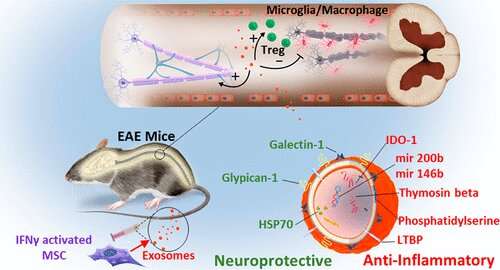Page 9076
Jun 5, 2019
Supercharging adoptive T cell therapy to overcome solid tumor–induced immunosuppression
Posted by Genevieve Klien in category: biotech/medical
The development of new cancer immunotherapies including checkpoint blockade and chimeric antigen receptor (CAR) T cell therapy has revolutionized cancer treatment. CAR T cells have shown tremendous success in certain B cell malignancies, resulting in U.S. Food and Drug Administration (FDA) approval of this approach for certain types of leukemia and lymphoma. However, response rates against solid cancer have been less successful to date. Approaches to modulate the immunosuppressive tumor microenvironment including targeting checkpoint pathways, modulating metabolic pathways, and generating cytokine-producing T cells have led to considerable enhancement of adoptive T cell immunotherapy, first in preclinical models and now in patients.
Jun 5, 2019
Intuitions Is The Highest Form Of Intelligence, According To Psychologist
Posted by Quinn Sena in category: futurism
According to Gerd Gigerenzer, who works at the Max Planck Institute for Human Development, true intuitiveness is having the necessary instinct to understand what knowledge we need to focus on and what we can afford to forget.
In his work ‘Gut Feelings: The Intelligence of the Unconscious’, Gerd explains how intuition and rationality can go hand in hand by using himself as an example. While immersed in his research, he often gets a hunch which he usually takes forward because he just knows that it will give him the answer. But he also double checks using scientific formulae to actually figure out the reasons behind his hunches. But when it comes to personal matters, he goes solely by what his intuition tells him.
Continue reading “Intuitions Is The Highest Form Of Intelligence, According To Psychologist” »
Jun 5, 2019
We’ve seen signs of a mirror-image universe that is touching our own
Posted by Quinn Sena in category: cosmology
New experiments are revealing hints of a world and a reality that are complete reflections of ours. This mirrorverse may be able to solve the mystery of the universe’s missing dark matter.
Jun 5, 2019
Holographic Quantum Error Correcting Codes
Posted by Quinn Sena in category: quantum physics
Jun 5, 2019
Quantum Leaps, Long Assumed to Be Instantaneous, Take Time
Posted by Quinn Sena in category: quantum physics
An experiment caught a quantum system in the middle of a jump — something the originators of quantum mechanics assumed was impossible.
Jun 5, 2019
David Sinclair – Slowing down Aging (VIDEO)
Posted by Paul Battista in categories: biotech/medical, education, genetics, life extension

https://youtube.com/watch?v=lA4DbN01q70
David A. Sinclair, Ph.D., A.O. is an Australian biologist and a Professor in the Department of Genetics and co-Director of the Paul F. Glenn Center for the Biology of Aging at Harvard Medical School. He is best known for his work on understanding why we age and how to slow its effects. He obtained his Ph.D. in Molecular Genetics at the University of New South Wales, Sydney, and received the Australian Commonwealth Prize. In 1995, he received a Ph.D. in Molecular Genetics then worked as a postdoctoral researcher at the Massachusetts Institute of Technology with Leonard Guarente. Since 1999 he has been a tenured professor in the Genetics Department of Harvard Medical School.
Dr. Sinclair is co-founder of several biotechnology companies (Sirtris, Ovascience, Genocea, Cohbar, MetroBiotech, ArcBio, Liberty Biosecurity) and is on the boards of several others. He is also co-founder and co-chief editor of the journal Aging. His work is featured in five books, two documentary movies, 60 Minutes, Morgan Freeman’s “Through the Wormhole” and other media.
Continue reading “David Sinclair – Slowing down Aging (VIDEO)” »
Jun 5, 2019
Signs & Symptoms of Bone Marrow Disease
Posted by Genevieve Klien in categories: biotech/medical, materials
Bone marrow is a soft spongy material that is located inside of the bones. Bone marrow is necessary for the transition that stem cells make to become one of the types of blood cells (red blood cells, platelets or white blood cells). Bone marrow disease occurs when there is some kind of abnormality or interference with the production of blood cells. Leukemia, aplastic anemia and myelodysplastic syndromes (MDS) are three types of bone marrow disorders that affect the production of blood cells and the bone marrow. Symptoms of each type of bone marrow disease will vary according to its severity, but tend to be similar in nature.
Jun 5, 2019
Pfizer had clues its blockbuster drug could prevent Alzheimer’s but kept it secret
Posted by Paul Battista in categories: biotech/medical, neuroscience
Why didn’t it tell the world? Drug companies frequently have been pilloried for not fully disclosing negative side effects of their drugs. What happens when the opposite is the case?
A team of researchers inside Pfizer made a startling find in 2015: The company’s blockbuster rheumatoid arthritis therapy Enbrel, a powerful anti-inflammatory drug, appeared to reduce the risk of Alzheimer’s disease by 64 percent.
The results were from an analysis of hundreds of thousands of insurance claims. Verifying that the drug would actually have that effect in people would require a costly clinical trial — and after several years of internal discussion, Pfizer opted against further investigation and chose not to make the data public, the company confirmed.















